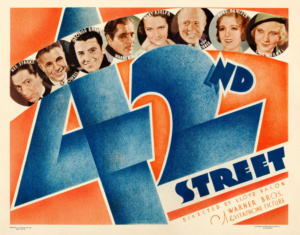Jazz Goes to the Movies on The Night Beat
 “Jazz Goes to the Movies” is back for another series of shows throughout the month of March. Join Night Beat host Doug Crane each and every Wednesday evening beginning at 8 pm as he delves deep into film history and songs that have become favorites of jazz musicians. Here’s what’s on tap for Week One: The lives of composer Frank Churchill (b. 10/20/1901, d. 5/14/1942) and lyricist Al Dubin (b. 6/10/1891, d. 2/11/1945) were filled with triumph but eventually succumbed to tragedy. Both were among the most significant figures as Hollywood shifted from silent film to “talkies.”
“Jazz Goes to the Movies” is back for another series of shows throughout the month of March. Join Night Beat host Doug Crane each and every Wednesday evening beginning at 8 pm as he delves deep into film history and songs that have become favorites of jazz musicians. Here’s what’s on tap for Week One: The lives of composer Frank Churchill (b. 10/20/1901, d. 5/14/1942) and lyricist Al Dubin (b. 6/10/1891, d. 2/11/1945) were filled with triumph but eventually succumbed to tragedy. Both were among the most significant figures as Hollywood shifted from silent film to “talkies.”
Beginning in 1930, Frank Churchill was one of three composers (Bert Lewis and Leigh Harline were the other two) tasked with writing the scores for Walt Disney’s “Silly Symphony” cartoons. Prior to his departure from the Disney studio at the end of 1929, Carl Stalling composed the music for all of the “Silly Symphony cartoons”. Stalling was the person who suggested to Walt that the cartoons be referred to as “Silly Symphonies”. If Stalling’s name sounds familiar, he was hired by Warner Brothers to compose all of the music for their series of “Merrie Melodies” and “Looney Tunes”, a position he held until 1958. But I digress.
In 1933, Frank Churchill’s score for the “Three Little Pigs” cartoon included what became the Disney studio’s first hit song, “Who’s Afraid of the Big Bad Wolf?” The cartoon won the Oscar for Best Animated Short Film.
In 1937, the trio of Churchill, Lewis and Harline was tasked with writing the score for the Disney studio’s first full-length animated feature film, “Snow White and the Seven Dwarfs”. Along with lyricist Larry Morey, Churchill was responsible for writing the major songs, many of which are still popular today including “Someday My Prince Will Come”, “Whistle While You Work” and “Heigh-Ho”. Lewis and Harline composed the incidental music.
In 1941, Churchill and Oliver Wallace wrote the musical score for “Dumbo” with Ned Washington composing the lyrics. Churchill and Wallace shared an Academy Award for Best Original Score. “Baby Mine” was nominated for Best Original Song.
Within a few weeks of receiving his Oscar at the Academy Award ceremony in 1942, Churchill shot and killed himself while sitting at his piano.
By the time Al Dubin began writing lyrics for songs heard in Warner Brothers’ musicals, he was already a successful lyricist. “Tip Toe through the Tulips” and “A Cup of Coffee, a Sandwich and You” were among his earliest. And as Warner Brothers had purchased the music publishing company that owned the rights to them (Witmark & Sons) in 1929, Carl Stalling would make frequent use of them in the scores he composed for the “Merrie Melodies” and “Looney Tunes” animated cartoons. But once again I digress.
Al Dubin had met composer Harry Warren in 1925. Their collaborations did not begin in earnest until they were working at Warner Brothers in the early 1930s. Hollywood was proving to be a refuge for many songwriters at the time due to the Depression, less work to be had on Broadway in New York City and especially the lure of big money writing music for movies.
Movie musicals released by Warner Brothers hadn’t fared especially well at the box office. As a last-ditch effort, the studio produced “42nd Street”. With choreography by Busby Berkeley and songs written by Harry Warren and Al Dubin, it not only established Warner as a major studio but staved off a potential bankruptcy for it. Besides the title song, the score included “You’re Getting to Be a Habit with Me” and “Shuffle Off to Buffalo”.
Dubin and Warren continued their collaboration for Warner Brothers and other studios composing a number of classic songs that are a part of the Great American Songbook including “Boulevard of Broken Dreams”, “I Only Have Eyes For You”, “Lullaby of Broadway”(Academy Award for Best Song in 1935), “Lulu’s Back in Town”, “September in the Rain” and “Summer Night”.
In ill-health for the last few years of his life, Dubin passed away from barbiturate poisoning and pneumonia in February 1945.
Please join Doug Crane for Jazz Goes to the Movies each and every Wednesday evening in March beginning at 8 pm.
Stay connected to KUVO’s programs and our community! Sign up for the Oasis E-News today!
Become a Member
Join the growing family of people who believe that music is essential to our community. Your donation supports the work we do, the programs you count on, and the events you enjoy.
Download the App
Download KUVO's FREE app today! The KUVO Public Radio App allows you to take KUVO's music and news with you anywhere, anytime!
